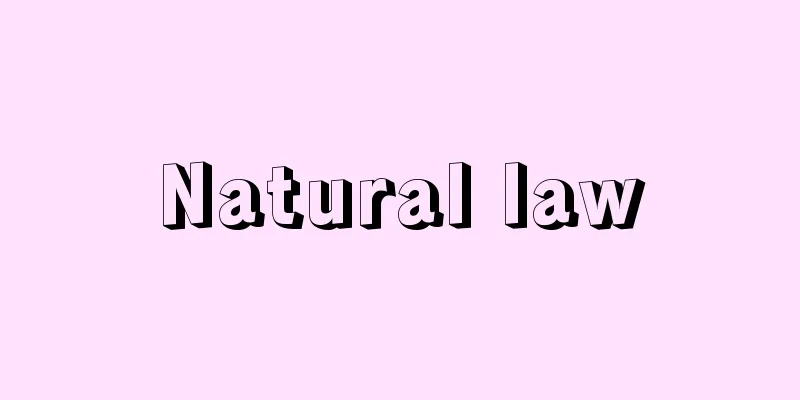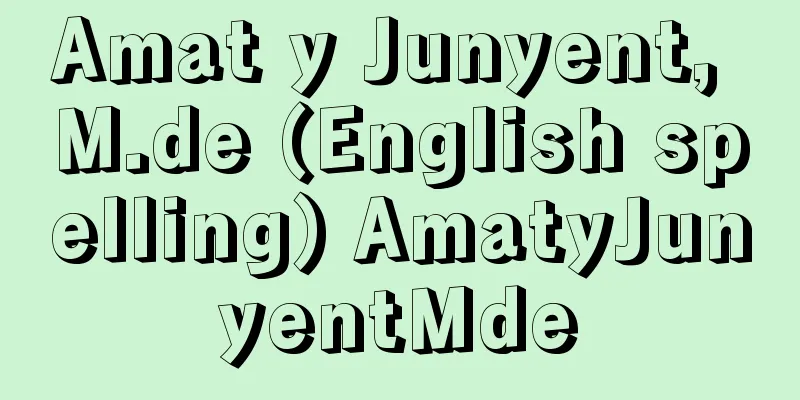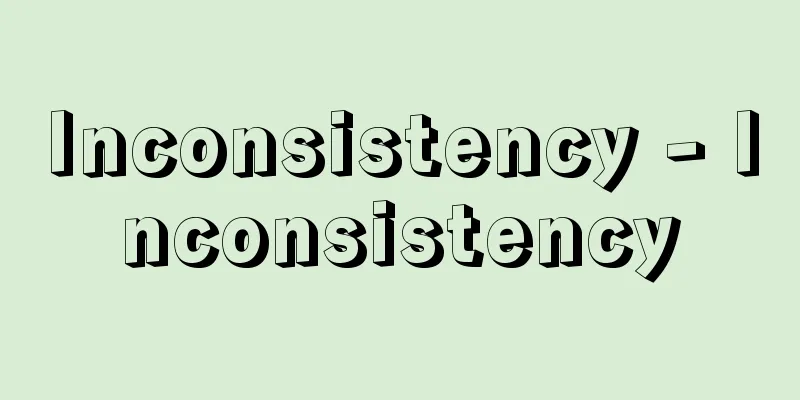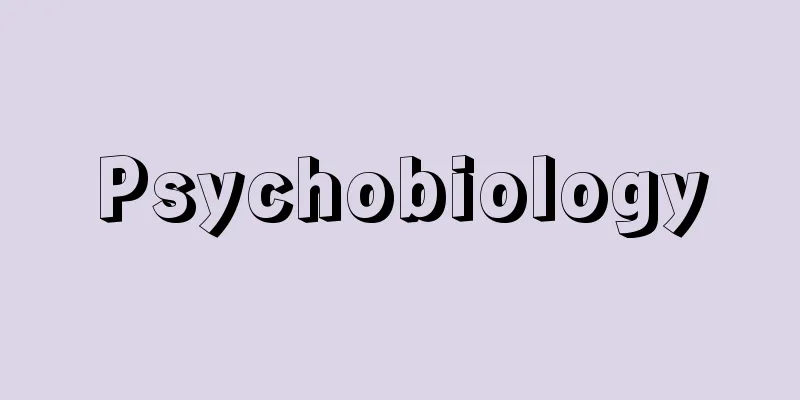Natural law

|
In contrast to positive law, which is artificially formed in a particular legal society, natural law refers to law that is assumed to exist naturally and be valid regardless of human intervention. While the content of positive law differs depending on the legal society, natural law, which is based on "nature," is said to be a law that is unchanging and universally effective. In contrast, legal positivism, which does not recognize legal norms other than positive law, denies the existence of such natural law. Natural law ideas have existed in various forms from ancient times to the present, and their forms are widely diverse depending on the difference in the concept of "nature." [Kobayashi] Changes in Natural Law ThoughtIn ancient Greece, natural law based on physis was contrasted with nomos, which was positive law, but in the mythological world view, this meant a cosmic order personified by divine figures such as thesis and dike. Later, in Plato, it meant an ideal order, and in Aristotle, it meant a teleological order based on the forms of beings. The idea of a natural order that permeates the world also influenced the idea of the ius gentium in Roman law, and was passed down to the Middle Ages in Western Europe through the acceptance of Aristotle's teleological physics by scholastic philosophy and the acceptance of Platonism through Augustine. In the Middle Ages, the Greek natural order was considered to be an eternal law inherent in God's reason, and each being was expected to realize eternal law in their own way. It was also said that natural law is an eternal law that applies to rational beings, humans, and is an eternal law inherent in the human mind. This theory of natural law, as represented by Thomas Aquinas, is based on so-called idealist metaphysics. In idealism, each individual thing has an inherent essence, which is also considered to be the goal that each individual thing must realize, and thus the order of existence and the order of norms are perceived as continuous. This idealism was subsequently rejected by nominalist philosophy in the late Middle Ages, and as a result, Thomistic natural law theory lost influence. Nominalism denies the objective existence of the essence inherent in each individual thing and considers only individual things to be real, thereby denying natural law as the natural order that permeates individual things, but at the same time, humans are liberated from the natural order and are considered to be beings that create their own norms. Humans, who were liberated from the natural order by the nominalist philosophy of the late Middle Ages, were considered in early modern philosophy to be beings in a "state of nature," and legal order was artificially established by contracts between humans in the state of nature. Therefore, natural law was replaced in early modern times by the idea of "natural rights," and these natural rights were considered to be the subjective rights of humans who create law. Early modern natural law theory has various positions, such as the Grotius position, which recognizes a certain social tendency in humans in the state of nature and bases the legal order on this tendency, and the Hobbesian position, which bases the legal order on the desire for self-preservation and the realization of this desire based on rational calculation. However, a common characteristic of early modern natural law theory is that it considers the legal order to be generated from the subjective rights of humans. Subsequently, natural law theory lost its influence due to various ideological and social factors, such as the dominance of positivist thought, the development of industrial society, and the diversification of values, and this continues to the present day. In the mid-20th century, especially in Germany and France, natural law was once again taken up theoretically in the form of theories such as the "nature of things," but it can be said that today there is almost no support for natural law in the sense of a law that exists in nature, is unchanging, and universally applicable. The theoretical problem of natural law theory is the idea that there are norms that are naturally valid, that is, that certain essential structures of human beings and society have normative meaning at the same time, and from a logical perspective, the monism of facts and values, which says that norms can be derived from facts. This monism is denied by the conventional wisdom in logic that regards normative propositions and factual propositions as logically incompatible propositions. In addition to such logical problems, the decline of natural law theory is also due to the fact that in modern legal culture, law is viewed instrumentally as a means to achieve a specific social purpose, and functionally as a system that can be manipulated and changed with a certain social function as a subsystem of the entire social system. The recognition of law as existing in nature can be said to belong to a way of thinking characteristic of static societies before the industrial society. If natural law thinking can still be theoretically valid under such circumstances, natural law in the sense of law that exists in nature and is applicable must be abandoned. Currently, those who seek to recognize certain invariant elements in law consider these elements inherent in law to be formal elements. The idea of the so-called "natural law with changing content" comes from the idea that, although the specific content of law differs depending on the legal society, a category must be assumed that constitutes a specific social phenomenon as a legal phenomenon, and that while the content of law is variable, this category is a priori invariant. In this type of natural law theory, in addition to the position that considers the a priori categories of law as epistemological categories, there is also the position that considers the universal forms of law as ontological categories based on the natural nature of human beings. The latter position seeks to recognize universal legal forms behind various legal cultures through a comparative study of legal cultures, just as a certain linguistic theory explains concrete languages derivatively from a priori grammar inherent in the human mind and recognizes universal forms inherent in the human mind behind the diversity of concrete languages, and a certain position in cultural anthropology recognizes the structural universality of culture based on the commonality of human nature behind cultural diversity. The idea of the universality of human nature, the idea of assuming a universal human nature at the root of the diversity of artificially created cultures, is a central theme in the theory of biosociology or human zoology in modern times. This theory, which studies biological humans from which cultural elements have been eliminated, empirically considers human social actions in the "natural state" and explores the natural institutions and norms that are the premise of all social institutions and social norms. Another characteristic of modern natural law thinking is that it treats natural law theory as a theory of justice. While traditional ontological natural law theory preaches norms that have substantial content and are objectively valid, modern theories of justice consider the formal values of positive law rather than the concrete values, and explore the formal conditions for a particular legal norm to be called a correct norm. The central theme of such theories of justice is the appropriate standard for the distribution of property or the burden of obligations among members of society, but on this point there is a conflict between the utilitarian position, which reduces justice to social utility, and the intuitionistic or fairness-based position, which holds that justice, like legal values such as fundamental human rights and freedoms, cannot be reduced to utility. As described above, natural law is thought of in modern times as a formal definition of positive law, but this type of natural law theory has also been criticized by legal positivism, and there are still many issues with natural law theory that need to be considered. [Kobayashi] [References] | | |Source: Shogakukan Encyclopedia Nipponica About Encyclopedia Nipponica Information | Legend |
|
特定の法社会において人為的に形成される実定法に対し、人為に関係なく自然的に存在し妥当すると想定される法をさす。実定法が法社会により内容を異にするのに対し、「自然」に基礎を置く自然法は不変的かつ普遍的に効力を有する法として説かれる。これに対して、実定法以外に法規範を認めない法実証主義は、このような自然法の存在を否定する。自然法思想は古代より現代に至るまでさまざまな形で存在しているが、「自然」観念の相違に応じてその形態も多種多様である。 [小林 公] 自然法思想の変遷古代ギリシアでは、ノモスたる実定法に対し、フィシスに基礎を置く自然法が対置されたが、これは神話的世界像においてはテシスやディケーといった神的形象により擬人化された宇宙的秩序を意味した。さらにその後、プラトンにおいてはイデア的秩序、アリストテレスにおいては存在者の形相に基礎を置く目的論的秩序を意味した。世界を貫く自然的秩序の思想は、ローマ法の万民法ius gentiumの観念にも影響を与え、さらにスコラ哲学によるアリストテレスの目的論的自然学の受容、およびアウグスティヌスを通じてのプラトン主義受容を通して西欧中世へと受け継がれていく。中世においては、ギリシア的自然秩序は神の理性に内在する永久法と考えられ、存在者はおのおのの仕方で永久法を実現すべきとされる。また自然法は、理性的存在者たる人間に対して妥当する永久法であり、人間精神に内在化された永久法であると説かれた。トマス・アクィナスにより代表されるこのような自然法論は、いわゆる実念論的形而上(けいじじょう)学に基礎を置いている。実念論においては、個物には個有の本質が内在し、この本質は同時に個物が実現すべき目的とされ、このようにして存在の秩序と規範の秩序は連続的にとらえられている。その後この実念論は、中世末期の唯名論哲学によって否定され、これに伴いトマス的自然法論も影響力を失っていく。唯名論は個物に内在する本質の客観的実在を否定し個物のみを実在者と考えることにより、個物を貫く自然秩序たる自然法を否定するが、同時に、人間は自然秩序から解放され、自ら規範を創造する存在と考えられることになる。 中世末期の唯名論哲学により自然秩序から解放された人間は、近世哲学においては「自然状態」に置かれた存在者とされ、法秩序は自然状態にある人間の契約により人為的に基礎づけられることになる。したがって、自然法は、近世においては「自然権」の観念によって置き換えられ、この自然権は法を創造する人間の主観的権利とされる。近世自然法論においては、自然状態に置かれた人間に、ある種の社会的傾向性を認め、この傾向性のうえに法秩序を基礎づけるグロティウスのような立場と、自然状態を自己保存の欲求、およびこの欲求の合理的計算に基づく実現を法秩序の基礎とするホッブズ的立場など、さまざまな立場がみられるが、共通して法秩序を人間の主観的な権利から生成するものと考える点に近世自然法論の特徴がみられる。 その後、自然法論は、実証主義的思想の優位、産業社会の発展、価値観の多様化などさまざまな思想的、社会的要因により影響力を失い、現代に至っている。 20世紀中葉、とくにドイツやフランスにおいて自然法論は「事物の本性」論などの形でふたたび理論的に取り上げられたが、自然的に存在し不変的かつ普遍的に妥当する法という意味での自然法を唱える立場は、今日ほとんど存在しないといってよい。 自然法論の理論的問題点は、自然的に妥当する規範が存在するという思想、すなわち人間や社会のある種の本質的構造が同時に規範的意味を有するという思想にあり、論理学的にみれば、事実から規範が導き出されうるとする、事実と価値の一元論にある。このような一元論は、規範命題と事実命題を論理的に架橋不可能な命題とみなす論理学上の通説により否定されており、またこのような論理的な問題以外にも、現代の法文化においては、法は特定の社会目的を実現するための手段として道具主義的にとらえられており、社会システム全体の下部システムとして一定の社会機能をもつ操作的に変更可能な制度として機能的にとらえられている点も、自然法論衰退の要因と考えられる。自然的に存在する法を認めることは、産業社会以前の静態的社会に特徴的な思考様式に属するといえよう。このような状況にあって自然法思考がなお理論的に効力をもちうるとすれば、自然的に存在し妥当する法という意味での自然法は放棄されねばならない。 現在、法のなかに、ある種の不変的要素を認めようとする立場は、法に内在するこのような要素を形式的要素と考える。いわゆる「内容の変化する自然法」という観念は、法の具体的内容が法社会により異なりつつも、特定の社会現象を法的現象として構成するカテゴリーが想定されねばならず、法の内容は可変的でありながらこのカテゴリーはア・プリオリで不変的である、という考え方に由来する。 この種の自然法論には、法のア・プリオリなカテゴリーを認識論的カテゴリーと考える立場以外に、法の普遍的形式を人間の自然的本性に基づく存在論的カテゴリーと考える立場がある。後者の立場は、たとえば言語学のある理論が人間精神に内在する先験的な文法から派生的に具体的言語を説明し、具体的言語の多様性の背後に人間精神に内在する普遍的形式を認めるのと同様に、また文化人類学のある立場が文化の多様性の背後に、人間的自然の共通性に基づく文化の構造的普遍性を認めるように、法文化の比較論を通じて、多様な法文化の背後に普遍的な法形式を認めていこうとする。人間的自然の普遍性という思想、人為的に創造された文化の多様性の根源に普遍的な人間本性を想定する思想は、現代ではとくに生物社会学あるいは人間動物学といわれる理論の中心的テーマであり、文化的要素を払拭(ふっしょく)した生物学的人間を研究対象とするこの理論は、人間の社会的行為を「自然状態」において経験的に考察し、あらゆる社会制度、社会的規範の前提となる自然的な制度や規範を探究する。 さらに現代の自然法思考のもう一つ別の特色は、自然法論を正義論として扱う点にある。従来の存在論的自然法論が実質的内容をもち客観的に妥当する規範を説くのに対し、現代の正義論は実定法の具体的価値ではなく形式的な価値を考察し、特定の法規範が正しい規範といわれるための形式的条件を探究する。このような正義論の中心的テーマは社会構成員の間の財産分配ないし義務負担の妥当な規準であるが、この点をめぐり正義を社会的功利性に還元する功利主義的な立場と、正義を基本的人権や自由といった法価値と同様、功利性には還元しえないものとする直観主義的ないし公正論的立場が対立している。 以上のように、自然法は現代においては実定法を形式的に規定するものと考えられているが、この種の自然法論に対しても法実証主義からの批判があり、自然法論にはなお考察すべき多くの問題点がある。 [小林 公] [参照項目] | | |出典 小学館 日本大百科全書(ニッポニカ)日本大百科全書(ニッポニカ)について 情報 | 凡例 |
>>: Natural dialectics (English: Natural dialectics)
Recommend
Margarya melanoides (English spelling) Margaryamelanoides
...It is edible. The small pig snail Margarya mel...
Ryosaku Fujita
Born: August 25, 1892 in Niigata [Died] December 1...
Kyosha Taku - Kyosha Taku
... According to the people of the Song Dynasty, ...
Musk (English name) Chelonopsis moschata Miq.
A perennial herb of the Lamiaceae family that grow...
Battle report
…They are also called "Gunkimono", &quo...
Reverse window dressing
…Window dressing generally includes both overstat...
Mixed farming - kongou nougyo
A form of agricultural management in which crop c...
"The Morning Glory Maru Heads to the Eastern Sea" - The Morning Glory Maru Heads to the Eastern Sea
The story begins with the first episode, The Lion...
Phenomenology of Spirit (English: Phenomenology of Spirit)
One of the major works of Hegel, who is considere...
Ice belt
… [Structure, Strength] Icebreakers need to have ...
Tyndareōs (English spelling)
…often seen as a model of brotherly love. Son of ...
Phasianus soemmerringii intermedius (English spelling) Phasianus soemmerringii intermedius
…[Ryozo Kakizawa]. … *Some of the terminology tha...
Minkoff - Minkoff (English spelling) Svetoslav Minkov
1902‐66 Bulgarian author. A satirist who depicted ...
Prociphilus oriens
An insect of the Hemiptera family, Aphididae. This...
Einstein's relation
Between the diffusion coefficient D of a particle ...









